Grace
As we gather in the chapel here in old Kilmainham Jail
(continua)
(continua)
inviata da Dq82 8/4/2024 - 13:14
Lonely Banna Strand (the Ballad of Roger Casement)
anonimo
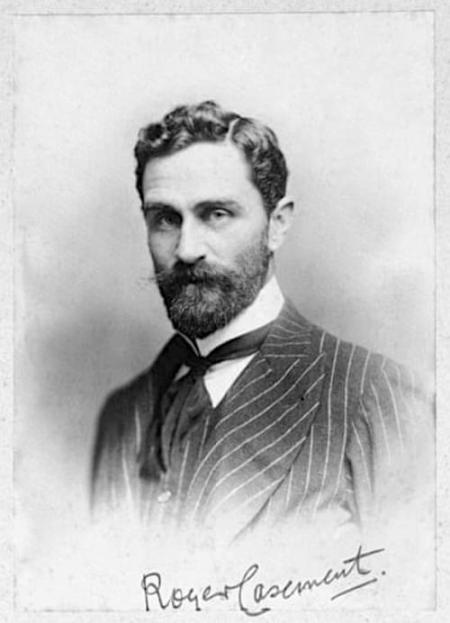
"Roger David Casement (1864 – 1916) was a humanitarian campaigner and an Irish patriot, poet, revolutionary, and nationalist. He was a British consul, famous for his reports and activities against human rights abuses in the Congo and Peru and also for his dealings with Germany before Ireland’s Easter Rising in 1916. An Irish nationalist and Parnellite in his youth, he worked in Africa for commercial interests and later in the service of Britain. However, the Boer War and his consular investigation into atrocities in the Congo led Casement to anti-Imperialist and, ultimately, to Irish Republican and separatist political opinions. He sought to obtain German support for a rebellion in Ireland against British rule. Shortly before the Easter Rising, he landed in Ireland and was arrested. He was subsequently convicted and executed by the British for treason. His remains were buried in the yard... (continua)
It was on Good Friday morning, all in the month of May.
(continua)
(continua)
inviata da Dq82 9/3/2024 - 10:22
Percorsi:
I conflitti Irlandesi
A Nation Once Again
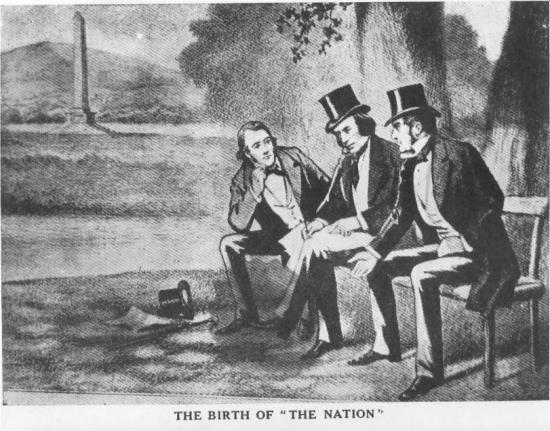
"A Nation Once Again" is a song, written in the early to mid-1840s by Thomas Osborne Davis (1814–1845). Davis was a founder of Young Ireland, an Irish movement whose aim was the independence of Ireland.
Davis believed that songs could have a strong emotional impact on people. He wrote that "a song is worth a thousand harangues". He felt that music could have a particularly strong influence on Irish people at that time. He wrote: "Music is the first faculty of the Irish... we will endeavour to teach the people to sing the songs of their country that they may keep alive in their minds the love of the fatherland."
"A Nation Once Again" was first published in The Nation on 13 July 1844 and quickly became a rallying call for the growing Irish nationalist movement at that time.
The song is a prime example of the "Irish rebel music" subgenre. The song's narrator dreams of a time when Ireland... (continua)
When boyhood's fire was in my blood
(continua)
(continua)
inviata da Lucone 31/12/2020 - 01:21
Percorsi:
I conflitti Irlandesi
Go on Home British Soldiers
Tommy Skelly
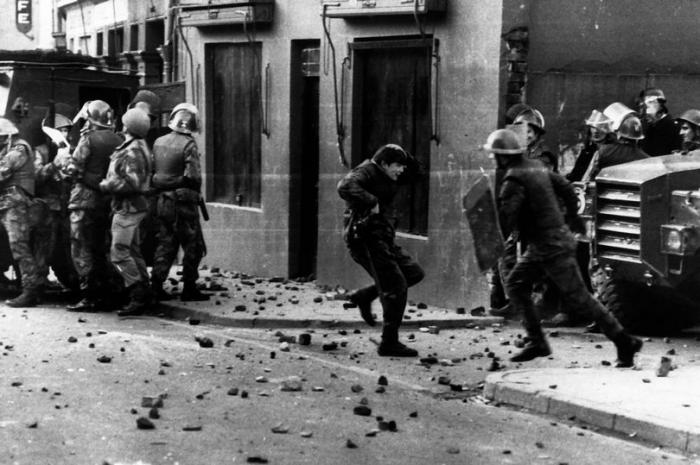
(1972)
interpretata da The Wolfe Tones e da noi dalla Banda Bassotti
Canzone che "invita" l'esercito britannico a lasciare l'Irlanda del Nord, dopo gli eventi del 30 gennaio 1972, noti come Bloody Sunday
Qualcuno nel 2019 ne ha realizzata una versione dedicata alla resistenza curda in Rojava, versione rilanciata sui social dalla giovanile dello Sinn Féin
interpretata da The Wolfe Tones e da noi dalla Banda Bassotti
Canzone che "invita" l'esercito britannico a lasciare l'Irlanda del Nord, dopo gli eventi del 30 gennaio 1972, noti come Bloody Sunday
Qualcuno nel 2019 ne ha realizzata una versione dedicata alla resistenza curda in Rojava, versione rilanciata sui social dalla giovanile dello Sinn Féin
Go on home British soldiers, go on home.
(continua)
(continua)
inviata da Lucone 21/10/2019 - 14:15
Percorsi:
I conflitti Irlandesi
Flight of the Earls
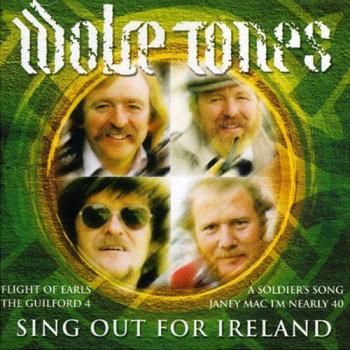
[1980s]
Credo che testo e musica siano di Liam Reilly, musicista associato al gruppo irlandese Bagatelle e attivo solo fino ai primi anni 90.
I Wolfe Tones l’hanno interpretata nel loro album “Sing Out For Ireland” del 1987
Con lo stesso titolo esistono altre canzoni, come quella di Phil Coulter, che probabilmente si riferiscono allo specifico episodio della Flight of the Earls (Imeacht na nIarlaí), quando il 4 settembre del 1607 alcuni nobili gaelici irlandesi, che avevano perduto la guerra dei 9 anni (1594-1603) contro gli inglesi, fuggirono precipitosamente dalle loro contee del nord, divenendo esuli in Roma (accolti dal Papa) e senza far mai più ritorno in patria.
Qui invece a quell’episodio storico ci si riferisce per raccontare dell’emigrazione irlandese nel mondo.
Credo che testo e musica siano di Liam Reilly, musicista associato al gruppo irlandese Bagatelle e attivo solo fino ai primi anni 90.
I Wolfe Tones l’hanno interpretata nel loro album “Sing Out For Ireland” del 1987
Con lo stesso titolo esistono altre canzoni, come quella di Phil Coulter, che probabilmente si riferiscono allo specifico episodio della Flight of the Earls (Imeacht na nIarlaí), quando il 4 settembre del 1607 alcuni nobili gaelici irlandesi, che avevano perduto la guerra dei 9 anni (1594-1603) contro gli inglesi, fuggirono precipitosamente dalle loro contee del nord, divenendo esuli in Roma (accolti dal Papa) e senza far mai più ritorno in patria.
Qui invece a quell’episodio storico ci si riferisce per raccontare dell’emigrazione irlandese nel mondo.
I can hear the bells of Dublin
(continua)
(continua)
inviata da Bernart Bartleby 16/11/2017 - 08:44
Erin Go Bragh

Interpreti Wolfe Tones, The Tossers
Éirinn go Brách si traduce come “Irlanda per sempre” sinonimo dell’identità irlandese. In realtà, non si conosce la precisa origine della parola bragh, in quanto essa non esiste nel vocabolario irlandese: si presume che chi per primo la utilizzò abbia semplicemente sbagliato lo spelling. Bragh, infatti, si può ricondurre sia a breá, che significa “bello”, “splendido”, sia a brách, la cui traduzione è appunto “per sempre”. È tradizionalmente una frase utilizzata come motto del movimento Repubblicano, e si ritrova infatti sulla sua bandiera. Con lo stesso titolo sono state chiamate canzoni diverse scritte non solo in Irlanda ma anche in Scozia. Questa è la canzone scritta nel 1920 da Peadar Kearney
LA RIVOLTA DI PASQUA 1916
La canzone si riferisce alla rivolta di pasqua del 1916 (lunedì 24 aprile) (Easter Rising) e ne commemora gli eroi.
Nella Pasqua... (continua)
Éirinn go Brách si traduce come “Irlanda per sempre” sinonimo dell’identità irlandese. In realtà, non si conosce la precisa origine della parola bragh, in quanto essa non esiste nel vocabolario irlandese: si presume che chi per primo la utilizzò abbia semplicemente sbagliato lo spelling. Bragh, infatti, si può ricondurre sia a breá, che significa “bello”, “splendido”, sia a brách, la cui traduzione è appunto “per sempre”. È tradizionalmente una frase utilizzata come motto del movimento Repubblicano, e si ritrova infatti sulla sua bandiera. Con lo stesso titolo sono state chiamate canzoni diverse scritte non solo in Irlanda ma anche in Scozia. Questa è la canzone scritta nel 1920 da Peadar Kearney
LA RIVOLTA DI PASQUA 1916
La canzone si riferisce alla rivolta di pasqua del 1916 (lunedì 24 aprile) (Easter Rising) e ne commemora gli eroi.
Nella Pasqua... (continua)
I’ll sing you a song of a row in the town,
(continua)
(continua)
inviata da Cattia Salto 26/8/2016 - 21:01
Percorsi:
I conflitti Irlandesi
The Blackbird of Sweet Avondale
anonimo
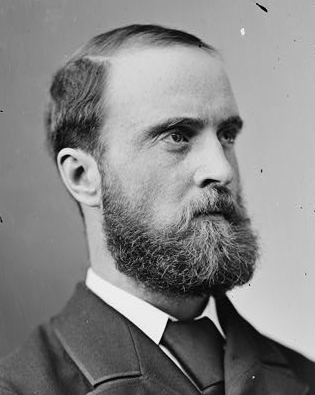
Versione dei Silly Wizard
Silly Wizard Version
Interpretata anche dai Wolfe Tones
Charles Stewart Parnell (1846-1891) fu membro della nobiltà protestante anglo-irlandese e uomo politico carismatico che lottò per realizzare la Riforma Agraria in favore dei contadini poveri (riduzione degli affitti, miglioramento delle condizioni di lavoro).
Nel 1870 fu tra i fondatori dell’Home Rule Party [in italiano “il partito per l’autonomia“] che si era posto come primo obiettivo il conseguimento dell’autonomia dell’Irlanda, anche se non era chiaro tra tutti i suoi sostenitori, se si auspicasse un completo distacco dell’Irlanda dal Regno Unito, o solo una limitata autonomia. Lo stesso Parnell arrivò a dire: “Nessuno di noi, sia in America che in Irlanda, non sarà mai soddisfatto fino a che non avremo distrutto l’ultimo anello che ci tiene legati all’Inghilterra.”
Uomo affascinante, grande oratore,... (continua)
Silly Wizard Version
Interpretata anche dai Wolfe Tones
Charles Stewart Parnell (1846-1891) fu membro della nobiltà protestante anglo-irlandese e uomo politico carismatico che lottò per realizzare la Riforma Agraria in favore dei contadini poveri (riduzione degli affitti, miglioramento delle condizioni di lavoro).
Nel 1870 fu tra i fondatori dell’Home Rule Party [in italiano “il partito per l’autonomia“] che si era posto come primo obiettivo il conseguimento dell’autonomia dell’Irlanda, anche se non era chiaro tra tutti i suoi sostenitori, se si auspicasse un completo distacco dell’Irlanda dal Regno Unito, o solo una limitata autonomia. Lo stesso Parnell arrivò a dire: “Nessuno di noi, sia in America che in Irlanda, non sarà mai soddisfatto fino a che non avremo distrutto l’ultimo anello che ci tiene legati all’Inghilterra.”
Uomo affascinante, grande oratore,... (continua)
I
(continua)
(continua)
inviata da cattia salto 19/8/2016 - 01:56
Percorsi:
I conflitti Irlandesi
Lough Sheelin Side
anonimo
A song has been written about Lough Sheelin, called Lough Sheelin’ side and recounts the tale of an eviction. It is not known for certain whether the song is of Cavan, Meath or Westmeath origin as the lake borders all three counties, and there were extensive clearances of tenants in the past famine years in both Cavan and Westmeath. However, there was a mass eviction one cold February night at a place called Tonagh in the late 1840s. Then Tonagh was a thriving village located near Ross on the Meath shores of the lake and not far from Mountnugent. Some 700 poor souls were thrown from their homes. The song probably relates to this eviction scene. In an article in the Heart of Breffni (1984) Seamus P O’ Mordha cites the first printed source of the song from the Anglo Celt. The editorial note that appears under the title of the song states “The Following Song was popular many years ago. Ed. A.C.”... (continua)
Farewell! my country, a long farewell,
(continua)
(continua)
inviata da Donquijote82 9/11/2015 - 11:22
The Wearing Of The Green
anonimo
La canzone è tradizionale probabilmente collocabile alla fine del 1700 e del testo esistono molte varianti, quello che è diventato standard oggi è stato scritto dal dublinese Dion Boucicault nel 1864 per la sua commedia Arragh na Pogue ("The Wicklow Wedding"). La ultime due strofe aggiunte dal commediografo fanno riferimento alla migrazione verso l'America. La melodia è stata attribuita da qualche buontempone a Turlough O'Carolan e ripetuta nel web, ora chi trova la melodia tra questa raccolta completa di O'Carolan vince un tapiro! (vedi)
THE WEARING OF THE GREEN
(continua)
(continua)
inviata da Cattia Salto 16/5/2015 - 01:12
General Munro
anonimo
[dopo il 1798]
Canzone di autore anonimo (o forse dello stesso narratore, che nella prima strofa viene individuato in tal George Campbell, giovane “United Man”) risalente alla fallita ribellione irlandese del 1798, quella capitanata da Wolfe Tone.
Nota anche come “General Munroe”
Testo trovato su A Small Collection Of '98 Songs
Incisa da moltissimi artisti, in ordine cronologico: Wallace House (1959), Billy Meek, The Abbey Tavern Singers (1965), Paddy Tunney, Arthur Kearney, Frank Kelly e Joe Tunney (1966), The McPeake Family (1969), The Battering Ram (1973), The Wolfe Tones (1978), Frank Harte e Donal Lunny (1998, in occasione dei 200 anni dalla Irish Rebellion).
Henry Munro era un commerciante di Lisburn, vicino a Belfast, tra le contee di Antrim e di Down.
Benchè fosse benestante e protestante di fede (presbiteriano), nel 1795 si unì agli United Irishmen e ne divenne uno dei leader... (continua)
Canzone di autore anonimo (o forse dello stesso narratore, che nella prima strofa viene individuato in tal George Campbell, giovane “United Man”) risalente alla fallita ribellione irlandese del 1798, quella capitanata da Wolfe Tone.
Nota anche come “General Munroe”
Testo trovato su A Small Collection Of '98 Songs
Incisa da moltissimi artisti, in ordine cronologico: Wallace House (1959), Billy Meek, The Abbey Tavern Singers (1965), Paddy Tunney, Arthur Kearney, Frank Kelly e Joe Tunney (1966), The McPeake Family (1969), The Battering Ram (1973), The Wolfe Tones (1978), Frank Harte e Donal Lunny (1998, in occasione dei 200 anni dalla Irish Rebellion).
Henry Munro era un commerciante di Lisburn, vicino a Belfast, tra le contee di Antrim e di Down.
Benchè fosse benestante e protestante di fede (presbiteriano), nel 1795 si unì agli United Irishmen e ne divenne uno dei leader... (continua)
My name is George Campbell at the age of eighteen
(continua)
(continua)
inviata da Bernart Bartleby 5/11/2014 - 15:07
Take Me Home to Mayo
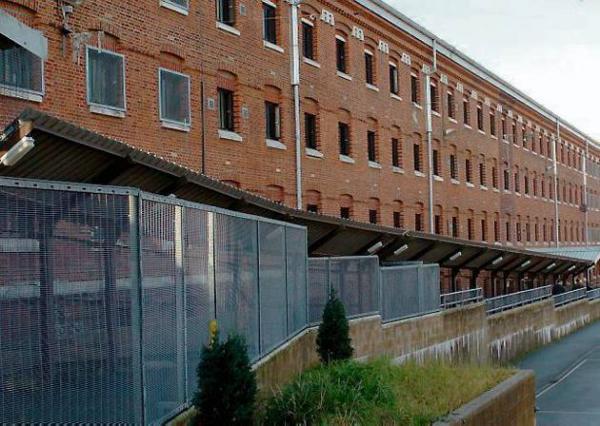
[1974]
Anche nota con il titolo de “The Ballad of Michael Gaughan”.
Scritta da Seamus Robinson di Carrick Hill, Belfast, songwriter, poeta e militante repubblicano, scomparso nel 2009.
Nel disco dei Dublin City Ramblers intitolato “Irish Republican Jail Songs”, pubblicato nel 1978.
Interpretata anche da molti altri musicisti irlandesi, come Christy Moore , Wolfe Tones , The Irish Lads e The Corrib Folk.
Se dico “Isle of Wight” la prima cosa che a tutti viene in mente è il mitico festival musicale del 1970. Pochi invece sanno che sull’isola davanti alle coste dell’Hampshire c’è una tetra prigione, quella di Parkhurst, entrata in funzione già nel lontano 1805.
E’ tra le mura di Parkhurst che nel 1974 morì Michael Gaughan, 24 anni, originario di Ballina, contea di Mayo, militante repubblicano e membro dell’IRA.
Michael Gaughan era stato arrestato qualche anno prima e condannato per una... (continua)
Anche nota con il titolo de “The Ballad of Michael Gaughan”.
Scritta da Seamus Robinson di Carrick Hill, Belfast, songwriter, poeta e militante repubblicano, scomparso nel 2009.
Nel disco dei Dublin City Ramblers intitolato “Irish Republican Jail Songs”, pubblicato nel 1978.
Interpretata anche da molti altri musicisti irlandesi, come Christy Moore , Wolfe Tones , The Irish Lads e The Corrib Folk.
Se dico “Isle of Wight” la prima cosa che a tutti viene in mente è il mitico festival musicale del 1970. Pochi invece sanno che sull’isola davanti alle coste dell’Hampshire c’è una tetra prigione, quella di Parkhurst, entrata in funzione già nel lontano 1805.
E’ tra le mura di Parkhurst che nel 1974 morì Michael Gaughan, 24 anni, originario di Ballina, contea di Mayo, militante repubblicano e membro dell’IRA.
Michael Gaughan era stato arrestato qualche anno prima e condannato per una... (continua)
Take me home to Mayo, across the Irish sea
(continua)
(continua)
inviata da Bernart Bartleby 8/8/2014 - 11:06
Admiral William Brown
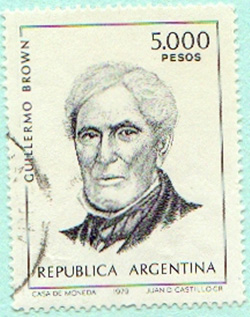
1987
A sense of freedom
A sense of freedom
William Brown, conosciuto anche come Guillermo Brown (Foxford, 22 giugno 1777 – Buenos Aires, 3 marzo 1857), è stato un ammiraglio irlandese, naturalizzato argentino. Le sue vittorie nella guerra di indipendenza, nella Guerra argentino-brasiliana e nell'episodio del blocco navale anglo-francese del Río de la Plata guadagnarono il rispetto e l'approvazione della popolazione argentina, per la quale è considerato un eroe nazionale. Creatore e primo ammiraglio delle forze marittime del Paese, è comunemente conosciuto come "il padre della Marina militare argentina"
From a county Mayo town came a man of great renown
(continua)
(continua)
inviata da DoNQuijote82 3/1/2014 - 16:53
Percorsi:
La guerra delle Falkland/Malvine
Castlebar
anonimo
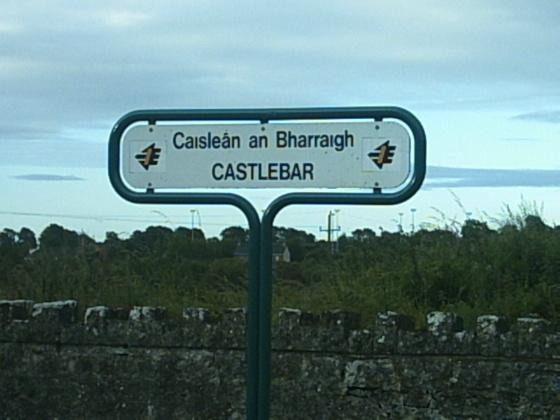
[dopo il 1778?]
Testo trovato su su Mudcat Café.
Castlebar (Caisleán an Bharraigh, ossia “Castello di Barry”) nella contea di Mayo è un luogo importante nella storia della resistenza degli irlandesi contro i dominatori britannici.
Quando nel 1775 scoppiò la guerra per l’indipendenza americana i francesi, storici nemici degli inglesi, si schierarono con gli indipendentisti. La Corona britannica dovette spedire migliaia di soldati oltre oceano ma il pericolo di un aggressione da parte della Francia (e della Spagna) restava anche in Europa. Sicchè, facendo leva sul diffuso sentimento antifrancese, gli inglesi riuscirono ad arruolare molti irlandesi in una milizia volontaria, gli “Irish Volunteers”…
“Re Giorgio i suoi soldi può ficcarseli in quel posto, io non vado a combattere le guerre degli inlgesi e me ne resto come un puciu nella mia Castlebar…”
Il giovane irlandese... (continua)
Testo trovato su su Mudcat Café.
Castlebar (Caisleán an Bharraigh, ossia “Castello di Barry”) nella contea di Mayo è un luogo importante nella storia della resistenza degli irlandesi contro i dominatori britannici.
Quando nel 1775 scoppiò la guerra per l’indipendenza americana i francesi, storici nemici degli inglesi, si schierarono con gli indipendentisti. La Corona britannica dovette spedire migliaia di soldati oltre oceano ma il pericolo di un aggressione da parte della Francia (e della Spagna) restava anche in Europa. Sicchè, facendo leva sul diffuso sentimento antifrancese, gli inglesi riuscirono ad arruolare molti irlandesi in una milizia volontaria, gli “Irish Volunteers”…
“Re Giorgio i suoi soldi può ficcarseli in quel posto, io non vado a combattere le guerre degli inlgesi e me ne resto come un puciu nella mia Castlebar…”
Il giovane irlandese... (continua)
It being on a sultry summer day and I weary working at the hay,
(continua)
(continua)
inviata da Bernart 18/7/2013 - 09:06
Goodbye Mick
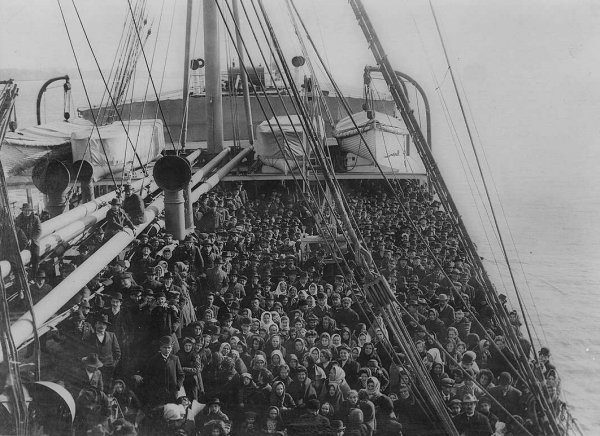
[1976]
Album “Across the Broad Atlantic”
Scritta da Brian Warfield
Canzone sull’emigrazione irlandese.
Album “Across the Broad Atlantic”
Scritta da Brian Warfield
Canzone sull’emigrazione irlandese.
The Ship it sails in half an hour to cross the broad Atlantic
(continua)
(continua)
inviata da Bartleby 12/5/2011 - 08:36
A Soldier's Return
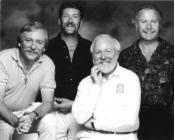
I went away to fight a war that small nations might be free
(continua)
(continua)
inviata da DonQuijote82 9/4/2011 - 11:12
Percorsi:
I conflitti Irlandesi
The Fields of Athenry
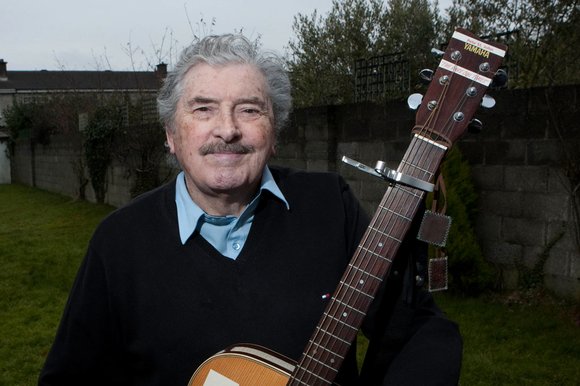
The Fields of Athenry is probably the best-known song about the Great Famine which raged over Ireland from 1845 until 1849.
The main character is awaiting transportation to the penal colony Botany Bay for stealing corn from a food depot. Whilst imprisoned his thoughts wander off to the abandoned fields of Athenry, a village just east of Galway Town.
Charles Trevelyan, the Permanent Secretary at the Treasury during most of the Famine years, was reluctant to hand out his corn and when the corn depots opened they mainly contained maize, or Indian corn. Due to its hard kernel the Irish were unable to process the maize.
When The Fields of Athenry was published in 1979 by Pete St. John the rumour was spread that the words already had been published in the 1880's. Evidence supporting this rumour however is never produced and St. John's claim is widely acknowledged.
Once published Paddy Reilly... (continua)
The main character is awaiting transportation to the penal colony Botany Bay for stealing corn from a food depot. Whilst imprisoned his thoughts wander off to the abandoned fields of Athenry, a village just east of Galway Town.
Charles Trevelyan, the Permanent Secretary at the Treasury during most of the Famine years, was reluctant to hand out his corn and when the corn depots opened they mainly contained maize, or Indian corn. Due to its hard kernel the Irish were unable to process the maize.
When The Fields of Athenry was published in 1979 by Pete St. John the rumour was spread that the words already had been published in the 1880's. Evidence supporting this rumour however is never produced and St. John's claim is widely acknowledged.
Once published Paddy Reilly... (continua)
By the lonely prison wall.
(continua)
(continua)
inviata da DonQuijote82 8/4/2011 - 11:48
Percorsi:
I conflitti Irlandesi
Kevin Barry
anonimo
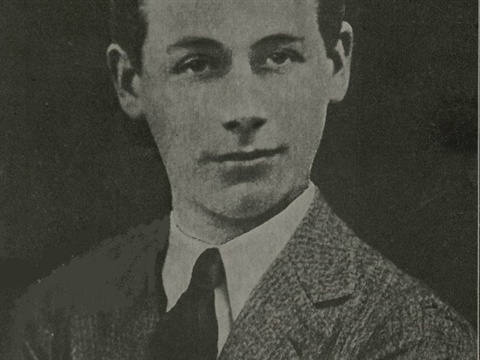
[1920]
Sull’aria della popolare “Rolling Home to Dear Old Ireland”
Una delle più note ballate repubblicane irlandesi dedicata a Caoimhín de Barra, in inglese Kevin Gerard Barry, che nel 1920, appena diciottenne, fu il primo militante dell’IRA ad essere giustiziato dagli inglesi. L’esecuzione del giovanissimo Barry, insieme alla morte, avvenuta pochi giorni prima, del sindaco di Cork Terence MacSwiney in seguito ad uno sciopero della fame ad oltranza, suscitarono un’ondata di sdegno in Irlanda e in tutta Europa e innescarono un’escalation della violenza nella guerra d’indipendenza irlandese (1919-1922).
La canzone è stata interpretata, tra gli altri, da Wolfe Tones, Clancy Brothers, Earl Robinson, Paul Robeson e Leonard Cohen.
Sull’aria della popolare “Rolling Home to Dear Old Ireland”
Una delle più note ballate repubblicane irlandesi dedicata a Caoimhín de Barra, in inglese Kevin Gerard Barry, che nel 1920, appena diciottenne, fu il primo militante dell’IRA ad essere giustiziato dagli inglesi. L’esecuzione del giovanissimo Barry, insieme alla morte, avvenuta pochi giorni prima, del sindaco di Cork Terence MacSwiney in seguito ad uno sciopero della fame ad oltranza, suscitarono un’ondata di sdegno in Irlanda e in tutta Europa e innescarono un’escalation della violenza nella guerra d’indipendenza irlandese (1919-1922).
La canzone è stata interpretata, tra gli altri, da Wolfe Tones, Clancy Brothers, Earl Robinson, Paul Robeson e Leonard Cohen.
In Mountjoy jail one Monday morning
(continua)
(continua)
inviata da Alessandro 20/1/2010 - 14:27
The Connaught Rangers
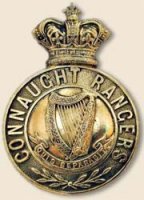
The Connaught Rangers, or Connaght Rangers, were established in 1793 as an Irish regiment in the British army and fought its first battles in Flanders against Napoleon's troops in 1794 during the Revolutionary Wars.
This first campaign was a disaster for the inexperienced regiment, but in the campaigns that followed in the West Indies, Egypt, India and South America the Connaught Rangers evolved in a respected, tough, and well-oiled war machine. During the Peninsula War from 1808 until 1814 the regiment fought in Wellington's army on the Iberian Peninsula and obtained the honourable nickname The Devil's Own.
Not only in battle the Connaught Rangers lived up to its nickname, as the regiment is also known for its plundering habits.
During the First World War the Connaught Rangers were deployed at several battlefields in for example Belgium and France. The regiment adopted It's A Long Way... (continua)
This first campaign was a disaster for the inexperienced regiment, but in the campaigns that followed in the West Indies, Egypt, India and South America the Connaught Rangers evolved in a respected, tough, and well-oiled war machine. During the Peninsula War from 1808 until 1814 the regiment fought in Wellington's army on the Iberian Peninsula and obtained the honourable nickname The Devil's Own.
Not only in battle the Connaught Rangers lived up to its nickname, as the regiment is also known for its plundering habits.
During the First World War the Connaught Rangers were deployed at several battlefields in for example Belgium and France. The regiment adopted It's A Long Way... (continua)
To the tiny homesteads of the West
(continua)
(continua)
6/9/2009 - 18:29
The Rifles Of The IRA
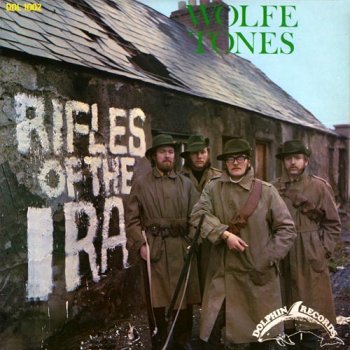
Album “Rifles of the I.R.A.” (1969).
In nineteen hundred and sixteen
(continua)
(continua)
inviata da Io non sto con Oriana 5/6/2009 - 14:05
Percorsi:
I conflitti Irlandesi
×
![]()

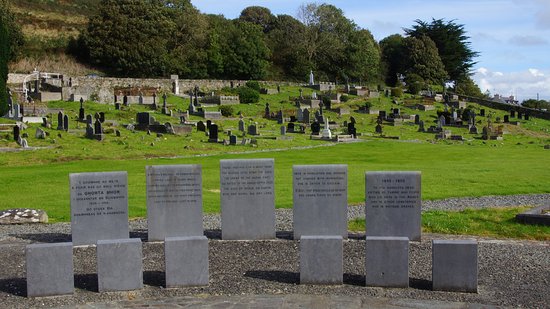
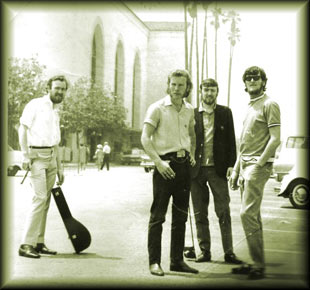
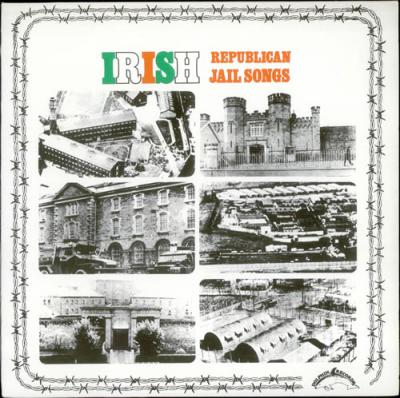
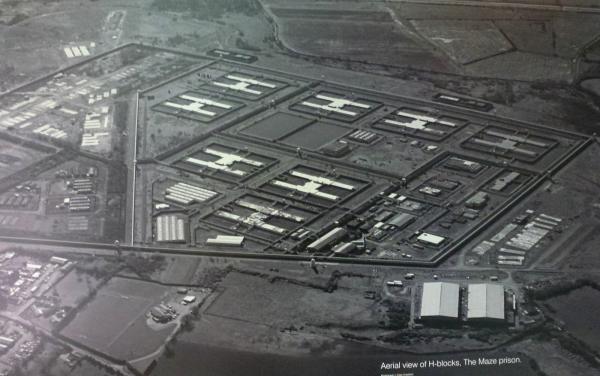
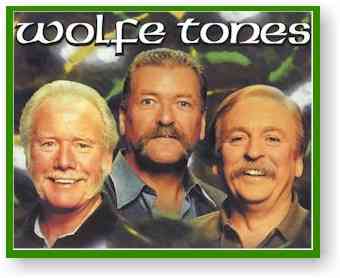
The song was written by brothers Frank & Sean O'Meara
Jim McCann, who often played with The Dubliners had the most success with it, but it was also sang by The Wolfe Tones, John McDermott, Barleycorn, and Anthony Kearns to name but a few singers. And at least also Andrea Rock & the Rebel Poets in their Ep "Mnà" (Women).
It was written about Joseph Plunket and Grace Gifford who married hours before Joseph was executed for his part in the 1916 rising in Dublin
Tom Clarke was a source of inspiration in the Post Office.
There was Joseph Plunket, pale and weak having come directly from the hospital where he had just undergone an operation.Joseph was shot seated, as he was too ill to stand for the firing squad.
He struggled to be with his comrades on that eventful morning. Margaret Skinnider said he looked like death and he met his death a few days later, not a natural one but... (continua)